This page lists our current research initiatives. At the moment, our efforts are centered around the operation of the "dédédé" online platform, and the development of "Wikitopia OS", a next-generation urban platform incorporating augmented reality, artificial intelligence, and other cutting-edge technologies. Other initiatives include the development of "Printable Garden", a 3D printing technology that introduces new ways to add greenery and nature to cities, and the design of "Roji Robo", a fleet of autonomous robots that assist various forms of citizen-led urbanism. We aim to deploy our research output through multiple channels, including commercialization, publication of source code, etc.
dédédé
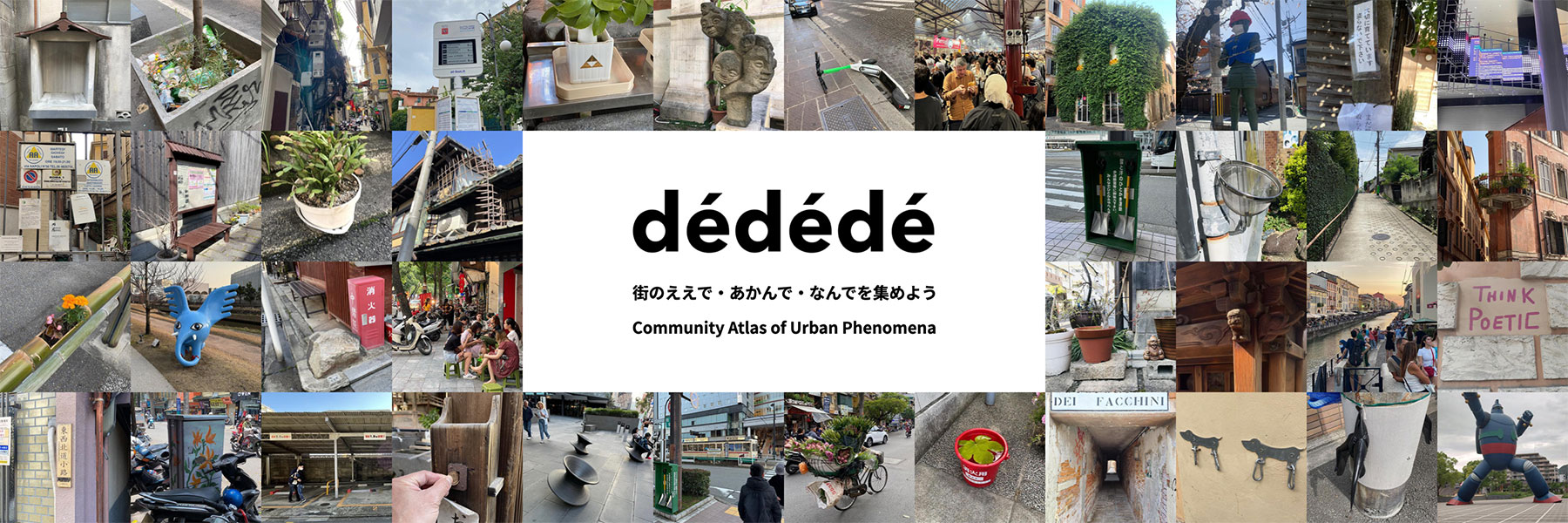
dédédé is an online platform that invites citizens to casually share the various positives, negatives, oddities, etc. they find in urban spaces. (The platform's name derives from eedé, akandé, and nandé, which translates to good, bad, and why in Kansai dialect.) The platform is intended to serve as an open forum that fosters public interest in urban design, gently steering people toward active participation in local urbanism. We believe that the uploaded data will be of value to urban designers, city officials, academic researchers, etc. as well. The platform is free to use, so please check it out!
- Reference(s):
- [1] Hill, D., Bruno, M., Melo, H.P.M., Takeuchi, Y., Loreto, V. Cities Beyond Proximity. Phil. Trans. A, 2024.
Ninja Codes
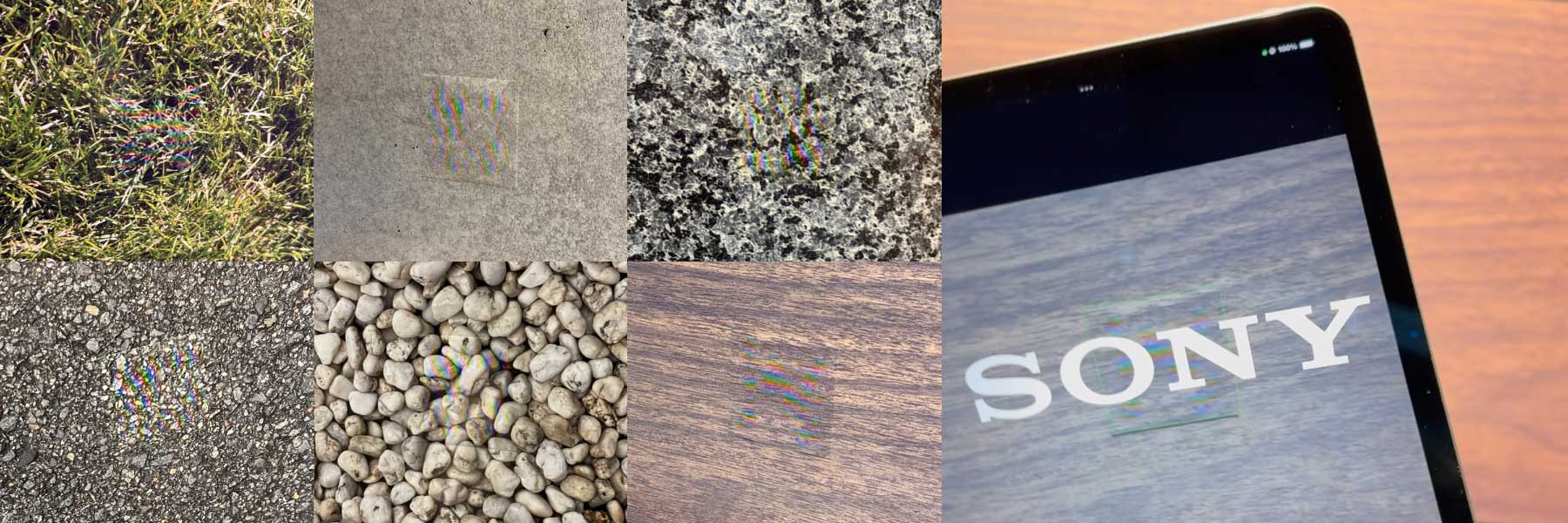
Ninja Codes are neurally-generated fiducial markers that can be made to naturally blend into real-world environments. An encoder network converts arbitrary images into Ninja Codes by applying visually modest alterations; the resulting codes, printed and pasted onto surfaces, can be used to provide stealthy location tracking in contexts where conventional fiducial markers (e.g., ARTags) are unsuitable for aesthetic and other reasons. Though originally developed as a technical component of Wikitopia OS, the codes can be used for various applications such as robotics and motion-based UIs. (See project page for more details.)
- Reference(s):
- [1] Takeuchi, Y., Imoto, Y., Kato, S. Ninja Codes: Neurally Generated Fiducial Markers for Stealthy 6-DoF Tracking. arXiv preprint.
- [2] Imoto, Y., Kato, S., Takeuchi, Y. Stealthy Location Tracking with Ninja Codes. SIGGRAPH Asia 2024 Em. Tech.
Wikitopia OS
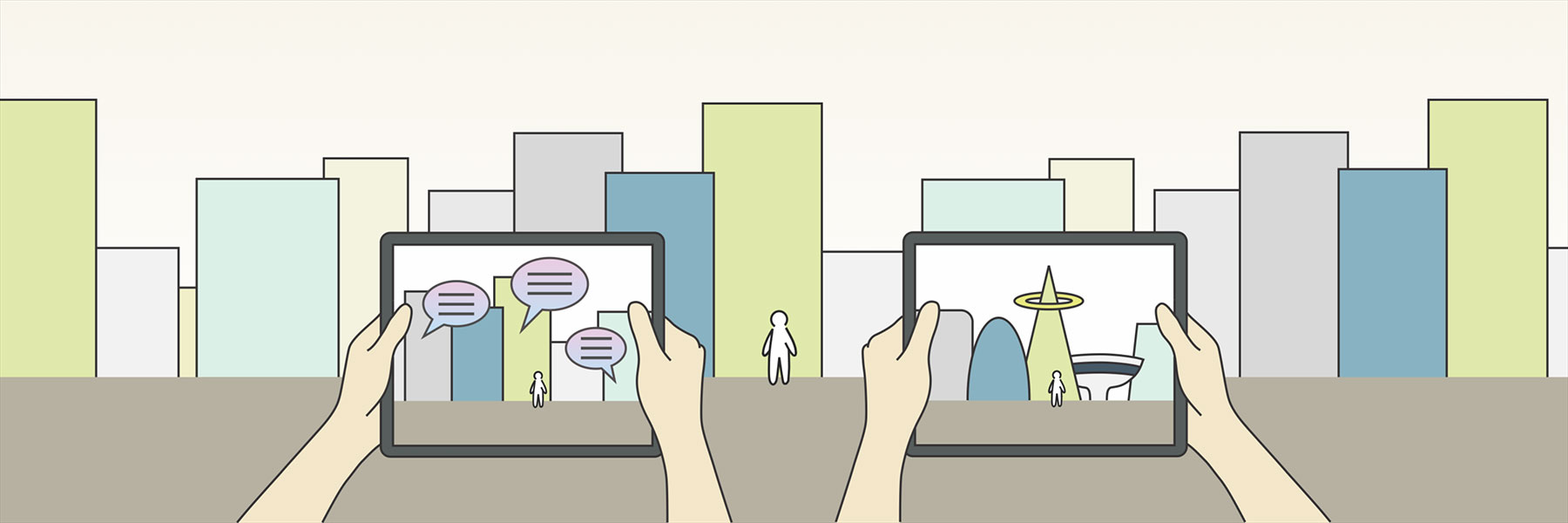
Wikitopia OS is a next-generation urban platform, which uses augmented reality to show various information about the city — citizens' opinions and ideas, development plans, speculative future visions, etc. — in ways tightly coupled with the actual urban environment. Using real-time image processing, the platform will be able to visualize the effects of large-scale urban transformations such as introductions of building height restrictions, conversions of roadways into pedestrian plazas, etc. The platform will also incorporate artificial intelligence to facilitate urban design and collective decision making.
- Reference(s):
- [1] Takeuchi, Y., Perlin, K. ClayVision: The (Elastic) Image of the City. Proc. CHI 2012.
Roji Robo
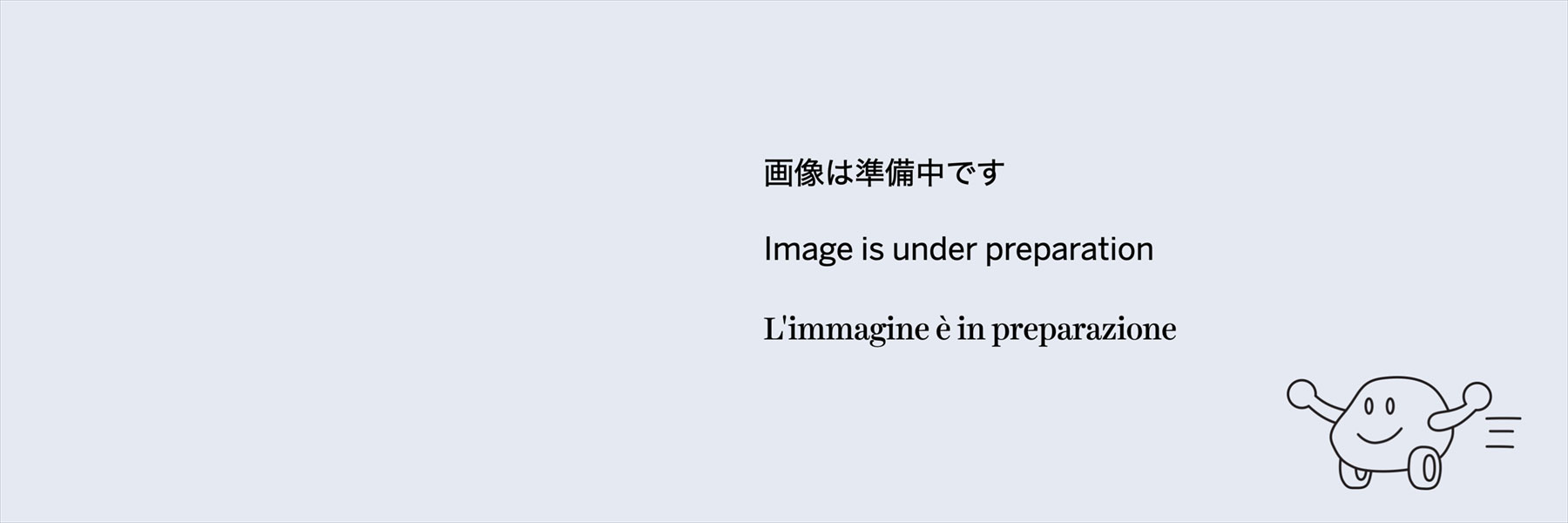
Autonomous robots that run along sidewalks and alleys are now a common sight in many cities around the world. While such robots are commonly used either for transportation (of goods and people) or surveillance, they also have clear potential to facilitate citizen-led urbanism. We are building a fleet of custom, community-owned robots that trot around neighborhoods, performing tasks such as watering plants, surveying air/water quality, and other miscelleous urban chores (e.g., helping out with festivals in Kyoto). This is an international collaboration involving teams from Japan, Italy, and Australia.
Printable Garden
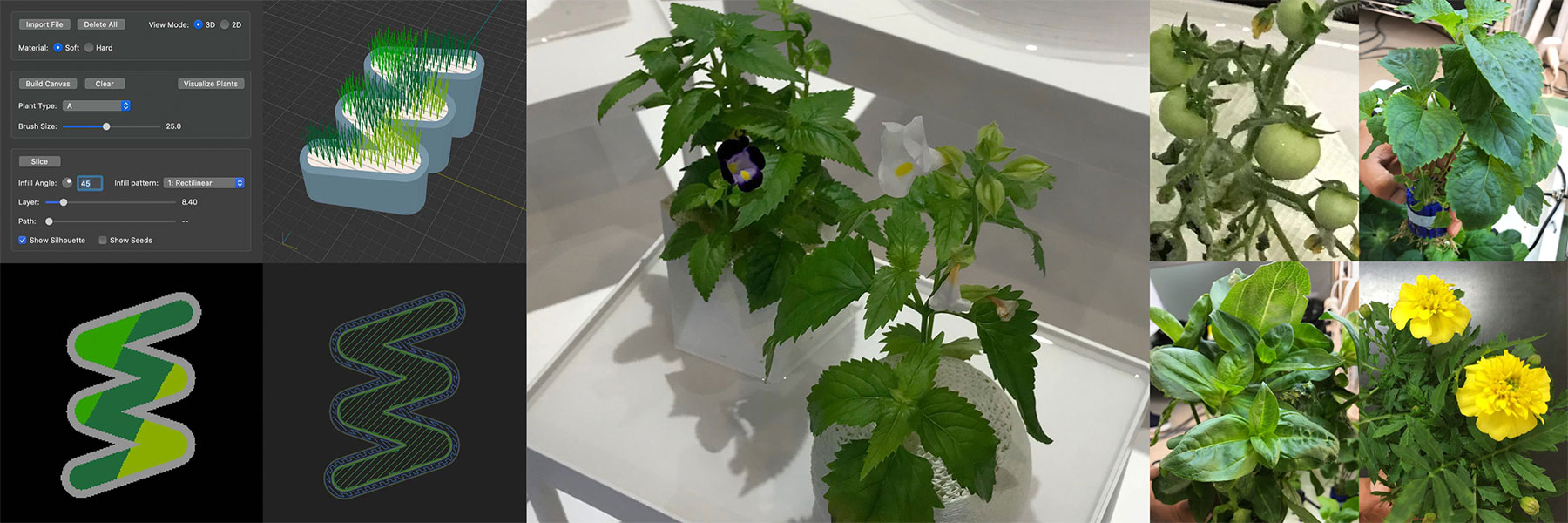
Community gardening, and other efforts to bring nature into the city, are some of the most common forms of citizen-led urbanism. To further accelerate such activities, we are developing a 3D printing technology that fabricates lush, small-scale "gardens" that also serve as habitats for targeted animals, insects, or birds (e.g., miniature sanctuaries for fireflies). Although the technology is in early research stage and is still impractical for real-world deployment, we believe that in the long term, our effort will help realize a future where citizens take central roles in shaping the ecosystems of their neighborhoods.
- Reference(s):
- [1] Takeuchi, Y. 3D Printable Hydroponics: A Digital Fabrication Pipeline for Soilless Plant Cultivation. IEEE Access, 2019.
AnyLight
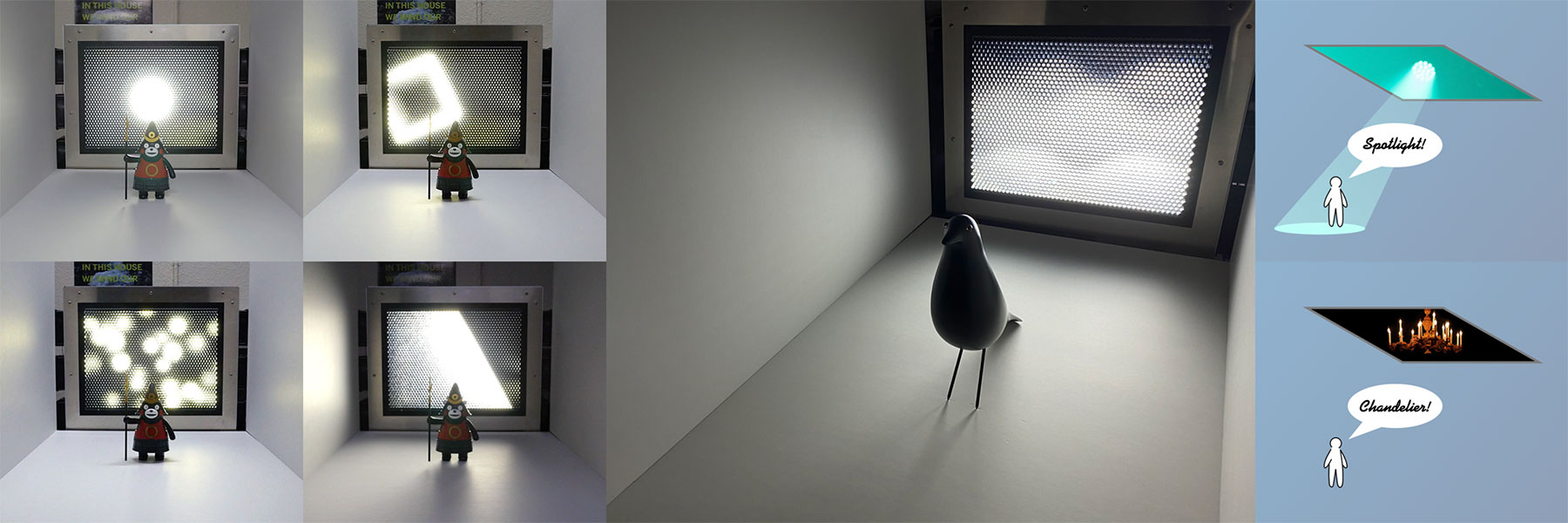
AnyLight is a panel-shaped lighting device that can mimic the illumination effects of various light sources, such as spotlight, chandelier, etc. In a room where AnyLight panels are installed across the ceiling, arbitrary light sources can be made to appear at any overhead position. The project began as an effort to design a programmable lighting device for public spaces, but our focus has since shifted to creating a general-purpose future lighting technology primarily targeting indoor spaces — as such, the project is no longer an official part of the Wikitopia Project, but we are continuing active development.
- Reference(s):
- [1] Takeuchi, Y. and Nagamine, K. Theory and Implementation of Integral Illumination. IEEE Access, 2022.